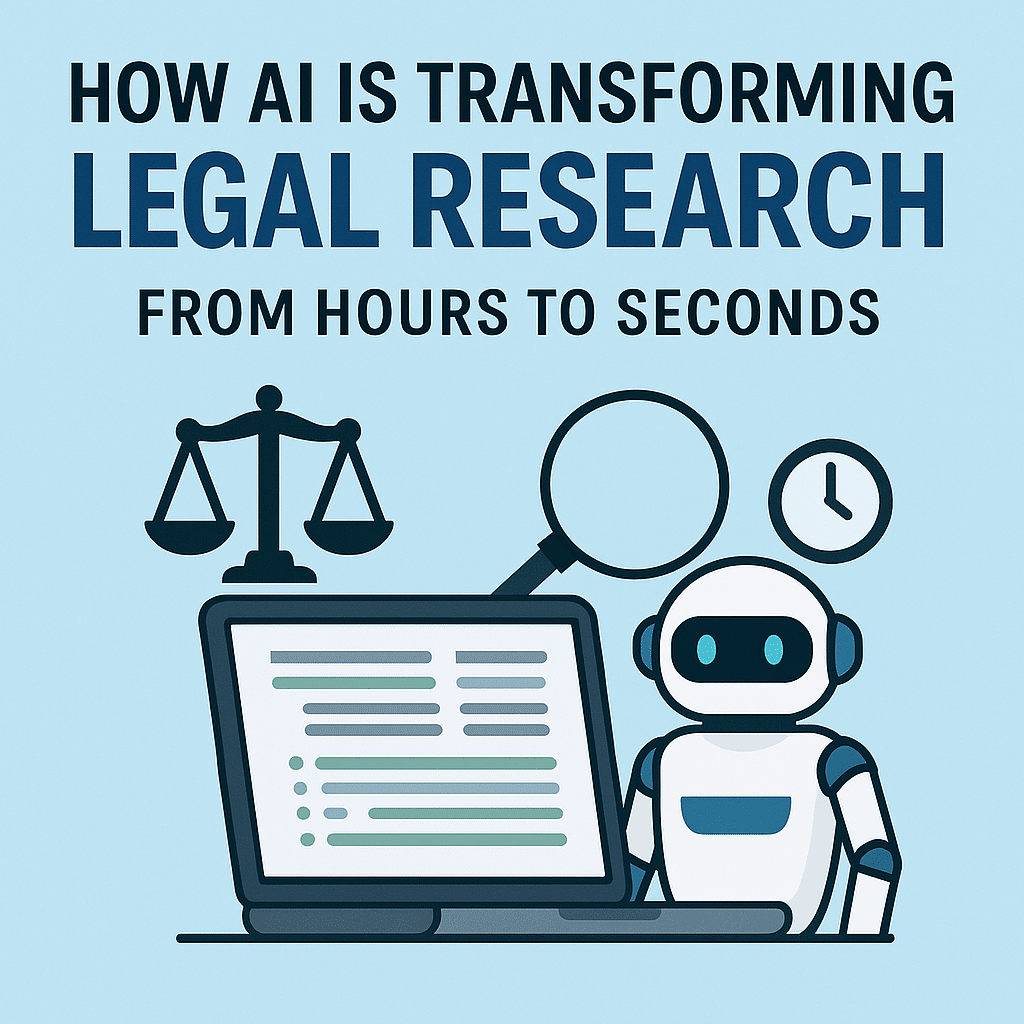Legal Industry In a New Direction.
One of the time-consuming aspects of legal practice has been legal research in the past decades. Lawyers and paralegals wasted days and days on the issue of searching, reading titles, and volumes of case law, statutes and precedents in order to construct arguments and ready to litigate.
Artificial Intelligence (AI) is now changing this process – hours or even days become a thing of the past, and one can do it within minutes or even seconds.
Artificial intelligence (AI) applications in the area of legal research are transforming the way lawyers are accessing, analyzing, and using information, changing forever the efficiency and precision of the legal profession.
What Is AI Legal Research?
AI legal research is the application of artificial intelligence, especially natural language processing (NLP) and machine learning (ML), to interpretation of legal texts, determination of helpful authorities, and the production of insights on its own.
The AI tools are contextually and intentionally understanding unlike the traditional search using keywords. In a case where a lawyer poses a complex question like, What are the recent precedents on breach of contract involving digital services, AI systems have the power to interpret the query, comprehend legal semantics and provide subtle answers with reference.
Supremacy AI, Lexis+ AI, Westlaw Precision, and Casetext CoCounsel are the top providers that incorporate the use of the large language model (LLM) to read and summarize the high volumes of documents almost instantly, which, in turn, makes legal research simpler and faster than previously.
From Hours to Seconds: The Speed Revolution
AI is the most important resource in legal research because it is fast and massive. Conventional legal research processes have meant that the professionals have had to through auxiliary methods of manually searching through numerous databases, reading long judgments, and comparing citations, which can take many hours.
The AI tools help to minimize that process to several seconds by:
- Searching through millions of documents worldwide on law.
- Law Determination of relevant cases and statutes through contextual knowledge.
- Drawing essential principles and summarizing them with specific references.
- Emphasizing the trends in the judicial opinions or the outcomes.
With this ability, a lawyer would be able to spend less time doing administrative searching and more time on strategic analysis, counseling a client, and preparation in the court.
Real-World Applications of AI in Legal Research
The AI technology has been deployed in almost all fields of law research and practice:
- Case Law Analysis
AI tools compare fact patterns across thousands of precedents, identifying similar cases and summarizing judicial outcomes. - Legal Drafting
With generative AI, legal professionals can draft memos, briefs, and contracts more efficiently by receiving AI-generated templates and summaries. - Due Diligence
In corporate law, AI can analyze contracts, financial data, and compliance documents, flagging inconsistencies or risks automatically. - Predictive Analytics
Some systems now predict the probable outcomes of cases based on historical rulings, judge behavior, and jurisdictional patterns. - Client Advisory
The understanding of AI benefits companies to provide recommendation and prediction of needs of clients more rapidly in the future.
Why AI Improves Accuracy and Insight
AI does not only take out the time needed to conduct research it does so in a smarter way.
Machine learning helps AI tools to learn and discover trends and connections between information data that may be missed by humans due to the huge volume of data. For example:
- Subtle variations in the language that a judge may use can be detected by AI and indicate a change in the legal interpretation.
- It is able to identify cases that come up regularly and identify their usefulness in the long-term.
- It is able to unearth latent relations of legal systems between jurisdictions.
Challenges and Ethical Considerations
However, AI in legal research has its challenges that are supposed to be approached responsibly:
Data Privacy and Confidentiality: Sensitive information is usually provided during legal data. AI systems are to be of high quality in data security.
- Algorithms bias: The risk of AI models being biased by their training data can impact the result of a research unless precision is observed.
- Fact and Check: AI summaries are to be checked by legal experts every time they are provided to determine the accuracy.
- Ethical Use: Attorneys should realize the usage of the AI devices when and how to keep transparency with their clients and courts.
After all, AI is not intended to substitute the legal researcher expertise but help it.
The Future of AI in Legal Research
The development of AI in law has only started.
The future development will consist of:
- A virtual legal assistant that is fully functional and can analyze a whole case.
- Voice research in law Research laws VL Voice-activated legal research A voice-activated legal search enables lawyers to interact with databases by voice.
- Trial and negotiation legal analytics.
- Access to justice can be improved with the help of AI as it helps the population to access trusted information about the law more readily.
It is already early enough to see law firms that are adopting AI gaining a competitive advantage by saving money, improving precision, and guaranteeing satisfied clients.
“Explore AI-powered legal research in action at AI LawGPT.com and see how you can turn hours of case analysis into seconds.”

